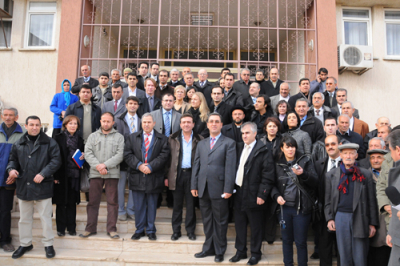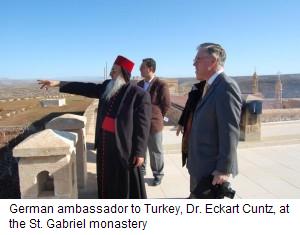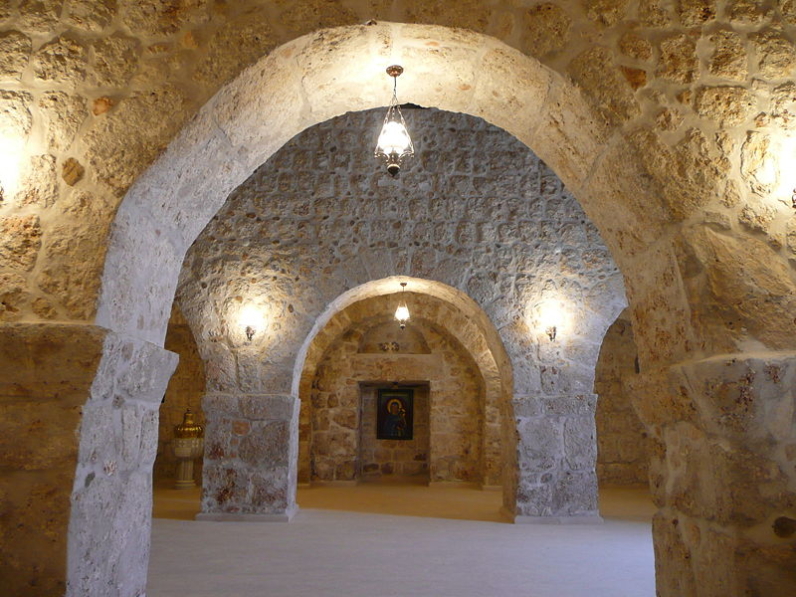

 Tur Abdin, Turkey (AINA) -- Facing massive criticism and intense scrutiny from European officials, the Turkish court in Mardin has cancelled the trial against the Saint Gabriel monastery scheduled for Christmas Eve and dismissed most charges that were to be adjudicated on that day, including the two main charges that the monastery was established illegally and its activities are violating Turkish law. The court scheduled trials for January 16, to address the issue of a wall the monastery built, and February 11, to determine if 270 hectares that were confiscated by the government belong to the monastery.
Tur Abdin, Turkey (AINA) -- Facing massive criticism and intense scrutiny from European officials, the Turkish court in Mardin has cancelled the trial against the Saint Gabriel monastery scheduled for Christmas Eve and dismissed most charges that were to be adjudicated on that day, including the two main charges that the monastery was established illegally and its activities are violating Turkish law. The court scheduled trials for January 16, to address the issue of a wall the monastery built, and February 11, to determine if 270 hectares that were confiscated by the government belong to the monastery.
150 observers attended the December 19 hearing, including European Parliament members and representatives of Assyrian organizations from throughout Europe. The EU was officially represented at the trial by Helen Storm, from the Swedish embassy in Turkey. A large delegation from Sweden was led by Parliament members Mats Pertoft, Yilmaz Kerimo, and Kerstin Laugren.
 German Chancellor Angela Merkel sent Germany's Ambassador Dr. Eckart Cuntz to visit the Monastery, talk to Bishop Samuel Aktas and to get a clear understanding of the issues in order to report back to the Government. (AINA 12-12-2008).
German Chancellor Angela Merkel sent Germany's Ambassador Dr. Eckart Cuntz to visit the Monastery, talk to Bishop Samuel Aktas and to get a clear understanding of the issues in order to report back to the Government. (AINA 12-12-2008).
Commenting on the trial, Rudi Sumer, one of the lawyers representing the ancient Assyrian monastery, founded in 397 A.D., said "This was expected, they want to extend the process and wear us out."
"This is the second time they have postponed the trial. I guess they are shocked by the attention it has gained in Europe and they know now that Turkey, which wants to become an EU member, is watched closely," said Simon Barmano, the envoy of the Assyrian Federation of Sweden. "They simply want to get rid of this attention and hope the interest will decrease by postponing the trial each time."
The interest from abroad was noticed by Turkish media. In an article (AINA 12-18-2008) published by the Hürriyet Daily News & Economic Review prior to the court hearing, Yilmaz Kerimo, member of the Swedish parliament and an Assyrian origin from Midyat, said "I hope a fair verdict will be delivered and the case will be resolved within Turkey's legal system, so that the country's image is not harmed in Europe." In the context of often reported problems with cadastral measurements he added, "Some of the Assyrian land was occupied [by the locals] and ended up in courts. Turkey must protect its Assyrian community. There are only 3,000 left in Midyat. Assyrians are a richness of Turkey and part of its mosaic."
 The Turkish and Kurdish plaintiffs, who belong to the so-called village guards, are believed to be encouraged by the local government party, AKP, and various Turkish authorities. In an article for the newspaper Gothenburg-Item, Sonja Aho, an independent journalist from Sweden, speaks of a double game: "Turkish authorities play a double game - on one hand they do not want to offend the local leaders in the field in order not to jeopardize any votes in the forthcoming elections to be held in March next year. On the other hand, the aim is EU membership, and therefore Turkey is trying to give the impression that they safeguard the rights of minorities."
The Turkish and Kurdish plaintiffs, who belong to the so-called village guards, are believed to be encouraged by the local government party, AKP, and various Turkish authorities. In an article for the newspaper Gothenburg-Item, Sonja Aho, an independent journalist from Sweden, speaks of a double game: "Turkish authorities play a double game - on one hand they do not want to offend the local leaders in the field in order not to jeopardize any votes in the forthcoming elections to be held in March next year. On the other hand, the aim is EU membership, and therefore Turkey is trying to give the impression that they safeguard the rights of minorities."
According to Janet Abraham, board member of the Tur Abdin Solidarity Group, and who was an observer at the trial, one of the main motives behind the neighboring villages' antagonism toward the monastery seems to be the "strong support the monastery receives from the Assyrians in the European Diaspora. The villagers ignore the direct benefits the whole region has received, since the monastery has became a point of attraction not only for Assyrians abroad, but also from tourist inside Turkey. In addition, some Kurdish-chiefs and village guards dislike the idea of Assyrians returning back to their villages while bringing European education and know-how, reclaiming and rebuilding their abandoned villages and homes."
The EU is closely monitoring the situation for religious groups in Turkey and it is monitoring how Turkey will handle this issue. Turkey must prove that its legal system is up to European standards and respect minorities and religious freedom. Assyrians worldwide are closely monitoring the developments in this case. As Kerimo said to the Hürriyet, "our goal is not to denigrate Turkey. On the contrary, we want to see the country in the EU. The monastery has been there for centuries. The Assyrians peacefully live in the region without engaging in any terrorist activity. I cannot understand why the group is branded as occupiers."
Click here for pictures of the St. Gabriel monastery.
For background information on this case, see here:
Turks, Kurds Threaten Assyrian Monastery in Turkey
Turkey Attempting to Confiscate Assyrian Monastery's Land
Report On The Imminent Problems Facing The Syriac Monastery Of St. Gabriel In Midyat, Turkey
Finnish Church Leaders Ask Turkey to Safeguard Assyrian Monastery
Conference of European Churches Urges Governments to Protect Assyrian Monastery in Turkey
Assyrians Part of Turkey
Thousands of Assyrians Rally in Sweden in Support of Besieged Monastery in Turkey
EU Lawmakers Raise Concerns Over Threats to Assyrian Monastery in Turkey
Assyrian Patriarch Sends Letter to Turkey Regarding Monastery
Turkey Disrespectful of Christianity and Assyrians: Swedish MPs
By Abdulmesih BarAbrahem

or register to post a comment.